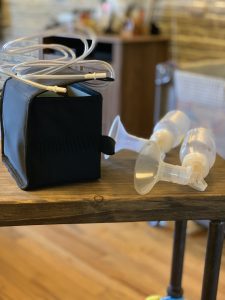When I was pregnant with my son Q, I decided to breastfeed. As I am a self-proclaimed nerdy bookworm, I read tons of literature on the topic. I was going to nail breastfeeding. However, breastfeeding, much like all the literature warned, was not easy. The second day home from the hospital, Q and I were both struggling. I had received my breast pump, and my husband, Bernard, convinced me to switch to pumping exclusively.
Switching to exclusively pumping was frustrating. All the literature I read and breastfeeding support groups that I belonged to said you must persevere during the challenging times. The overall opinion from everything I read was, you should only pump as a last resort or if you are going back to work. Exclusively pumping never occurred to me because it wasn’t mentioned; I felt my only options were breastfeeding from the breast or switching to formula. I felt discouraged by the lack of literature on exclusively pumping, which is why, for this week’s post, I decided to write about my journey as an exclusive pumper.
I pumped for twelve months, feeding Q only breastmilk until just before his first birthday when I started mixing in dairy and non-dairy milk. This week, he will drink the last of my frozen milk, and I am almost completely weaned off using the pump. I won’t say that my journey has always been easy, but switching to exclusively pumping allowed me to feed my son nutritious breastmilk without the stress that breastfeeding from the breast sometimes brings.
Before continuing, I feel it is important to recognize that exclusively pumping isn’t a realistic option for everyone; I know this. I have the opportunity to stay-at-home; therefore, my ability to pump as much and as long as I needed aided in my success. Not all moms, especially those in certain working professions, can pump whenever and for however long they want. My annoyance for the lack of support some working moms receive in this area is a discussion for another post.
Exclusive Pumping 101
- Pump often. All breastfeeding moms have one fear, and that is experiencing a dip in milk supply. I read that to keep milk supply up, you should feed your baby whenever they are hungry. I deduced that I should pump as frequently too. Early on, I read that the average newborn eats every 2-3 hours and will feed anywhere between 8-12 times a day, consuming 2-3 ounces each feeding. Therefore, every 2- 2.5 hours, I would pump while Q drank a bottle. Typically, I would pump until no more milk came out, which was about thirty minutes. I even did this throughout the night when Bernard would feed Q; I would get up and pump. I also pumped in the car when we would take long car rides. While I did take supplements during my pumping journey ( Legendairy Milk), the main reason I never saw a dip, I firmly believe, is because of the number of times I pumped.
- Stay Hydrated and Eat. I think one of the most challenging things when taking care of a newborn is remembering to take care of yourself. It is necessary to eat and drink plenty of water when pumping. I burned a ridiculous amount of calories each time I pumped, and keeping myself fueled helped in keeping my milk supply up but also gave me the energy I needed to go about my day.
- Create a frozen stash. Since I was pumping so much, I ended up having an over-supply, which allowed me to create a frozen stash. Having a frozen stash was great because I was able to use frozen milk if I was going to be away from Q for an extended time. Or, if I had more than one glass of wine and had to dump my milk.
- Pumping Supplies. Pumping supplies consisted of insurance provided breast pump, I was able to select the brand, and I chose Medela. The breast pump came with the basic parts you needed to get started. I did purchase via Amazon a second set of tubes, membranes, and valves. I found that the pump would lose its suction if I didn’t switch these parts out ever so often. I also purchase a hands-free pumping bra, which I would say is a must.
- Weaning Process. At eleven months, my drive to continue pumping was decreasing. My son seemed less interested in a bottle of breastmilk and more interested in eating real food. I switched him to a sippy cup and mixed breastmilk with dairy and non-dairy milk to wean him off – which he adjusted to very well. Weaning myself off the breast pump has been a little bit more tricky and slow-moving. I started decreasing the number of times a day I pumped each week. Once I got myself down to pumping twice a day, I reduced the amount of time I was pumping, again I did this weekly. I am now only pumping once a day for ten minutes, next week, I will switch to five, and likely stop as my milk supply has deteriorated.
Frustrations and Worries about Pumping
The biggest groan I hear about pumping is the amount of work it involves. I would hear women say, “You are tied to a machine,” “It is a lot of clean up,” or “It is time-consuming.” Around six months of pumping, I started to feel these same frustrations. Did I want to keep doing this for another six months? I ultimately decided that feeding Q breastmilk was most important to me, so I persisted. Clean up was the worst, but I managed the mess by cleaning the bottles and pumping supplies immediately after I finished so they didn’t pile up.
The other thing I most often heard from people who were considering switching from breastfeeding to exclusively pumping was the fear of losing the bond with their child. I am going to be honest here, that thought never crossed my mind. Q had spent nine months growing in my belly; he spends 85% of his day solely with me – there wasn’t a shot we weren’t bonded. When I would pump, Q was always laying on the Boppy next to me as I fed him his bottle, that is, until he would feed himself. Around nine months, I could no longer have him next to me on the Boppy because he would grab at the pumping tubes, at that point, I moved him to the Pack-n-Play right across from me. During the time that I pumped, to help the time go more quickly, I would read and interact with him. Therefore, despite not having the latch bonding that breastfeeding moms have, I had my version that, in my opinion, was just as good.
Why I loved Exclusively Pumping
The main reason I loved exclusively pumping was that I knew exactly how much milk Q was getting each time he ate. I never worried that he wasn’t getting enough. I also loved that other people could help feed Q. Lastly, I felt less stressed.
Being an exclusive pumper puts you in a category all on your own. You are not technically breastfeeding, but you are not formula feeding either. What I hope you can gather from this post is that exclusively pumping is an option, especially if feeding your child breastmilk is important to you. If I can do it for twelve months, so can you!
If you have any questions, please don’t hesitate to ask!

